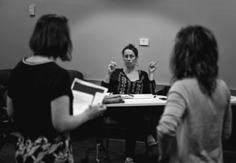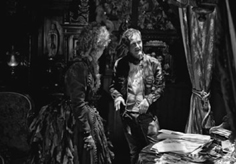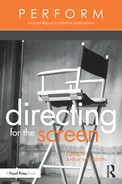DIRECTING FOR TELEVISION
Television directors are responsible for taking a story from script to the small screen. Anyone will tell you that directing for television is extremely competitive, and only the most hardworking, talented, and capable are able to thrive. That said, there’s more television today than there has been at any time in the history of television, and we’re seeing more and more groundbreaking shows hit the small screen. In fact, from many screenwriters’ perspectives, television is the place to be.
Here, we’ll take a look at the business of television directing. We’ll visit a handful of directors working around the world and examine some of the career strategies and recurring challenges that have come up for them over the years.
Finding a Job
To break into television directing, you may need to start out as a runner or an assistant and then as a continuity person or assistant director. Or you might get your start through an attachment program, or possibly working in an entirely different capacity on film or television sets. One such capacity is as an editor. There are many famous stories of editors who became directors—Robert Wise, for instance, who edited Citizen Kane and later directed The Sound of Music.
Geoff Portmann, an Australian director, was an editor for many years before he began directing television for an Australian public broadcasting network. He said this about breaking into the television market:
Television has a schedule and every slot has to be filled in the schedule. It’s a beast with a large appetite that needs to be fed. Because of this volume of content, it gives new directors opportunities—to make mistakes, develop their expertise, and try things that are slightly left of center.

Geoff Portmann
Photo by Erika Fish, QUT Creative Industries
Sometimes, there are ongoing positions available for directors with television networks and production companies. This means that you’re an employee with the company, earning a regular wage. You may even receive benefits, like paid holidays and sick leave.
One example of a director in full-time employment is Peter Ireland. He lives in London and works for a global music video cable channel.

Peter Ireland
Photo by Timothy Baker
Before he got the job, Ireland unsuccessfully contacted ninety-eight production companies seeking directing work. As part of his current role, he directs “promos,” which are like advertisements between programs that promote upcoming shows on the channel. But he didn’t get the job by writing an application and going for a formal interview:
When I couldn’t find work as a director, I fell back on editing. Eventually, I got some work editing promos for the creative director of the company I now work for. I was editing all of the promos he’d shot for a good six months, and then one day I dropped it in there that I was also a director. And he said, ‘Why not come and do some work for us?’
Ireland freely admits he’s been quite lucky. Typically, television directors will freelance, going from job to job, like “guns for hire” in the Old West. Freelance television directors are brought in for a defined amount of preproduction, production, and postproduction and don’t have control over the core narrative, tone, and style of the show they direct. They get directing work from crew networks and by word-of-mouth—that is, they find out by talking to others about when and where to find the next gig.
Once you reach a certain level as a director, though, you begin to find work because you’ve developed contacts with producers who want to work with you again. And at this point, you’re working with a manager or agent, who helps you make decisions about potential work that’s coming in.
Working With a Manager or Agent
Kim Farrant is a freelance television director based in Los Angeles with experience in documentaries, commercials, drama for television, and features. She got into directing via acting and has been working as a director for about twenty years. She met her agent in her final year of film school. Her agent helps her to negotiate her contracts and gives her an idea of how much she should charge for her services on a show. The agent might also get involved with things like sorting out the length of shooting days and weeks. An agent takes 10 percent of a director’s earnings, but Farrant says it’s well worth it: “My agent gives me another viewpoint, and sets up meetings with other artists and producers so we can discuss ideas and opportunities.”

Kim Farrant
Photo by James Dillon, QUT Creative Industries
Some directors also get a manager. Managers can’t negotiate contracts like agents do, but they can help guide the director’s career. A manager generally takes another 10 percent of your earnings.
Here’s someone else who can help you on your way to working consistently as a television director (or any kind of director, for that matter): a mentor. A mentor is someone who is genuinely interested in your vocational path and can give you advice but won’t expect payment. Mentoring relationships develop over time and are typically part friendship and part professional relationship. Some experienced television directors are open to mentoring new directors as they enter the industry, and for them it’s about passing on their knowledge and passion to the next generation.
Marc Munden is an established television director in the UK who started out making documentaries and has gone on to do a lot of television drama series, miniseries, and one-offs. He has had some very influential mentors, including Mike Leigh, Derek Jarman, Terence Davies, and Paul Watson—and he’s now a mentor to younger directors himself: “My first mentor is someone I respect enormously. He always treated me like an adult and taught me to know my own mind amidst the clamour of television production.”

Marc Munden
Photo by Nick Wall, Origin Pictures
Playing Nice
Munden has carved out a brand in the UK as an auteur television director who pushes the envelope. He’s often involved with the productions he plans to direct from the development stage all the way through to postproduction. He’s struggled to build his brand, but he concedes that as a younger, emerging director he may have been uncompromising to the point of putting many people off.
Nowadays, he acknowledges that while it’s the quality of your past work that will usually get you more work in the future, playing nice is also a key to success in television directing. Staying open to feedback and being polite and reassuring can make television directors easier to work with—and therefore, more employable.
“It’s a director’s job to push it to the point where you’re being shut down, and you have to not be afraid to be unpopular,” says Munden.
But there’s no point in doing that just for the sake of getting your way. I think you can easily make bad mistakes that way. It’s about seeing the big picture … you need to listen to what the producer is saying and what the writer is saying. The real art is to take their notes on board, listen, really consider it—and if it’s useful, to integrate it into your vision.
But before you even get to the set, getting to know and getting along with people in the industry is critical to the business side of television directing. This means attending networking events, festivals, and markets, and meeting people—especially the people who might be able to hire you, such as producers, commissioning editors, showrunners, and executive producers.
Pitching
If you’re developing your own television show—either alone or in collaboration with a producer or writer—you’ll need to be positioned to pitch your project and sell the concept to potential investors and distributors. When you’re out networking, you might find an opportunity to do just that. But you’ll likely only have a few minutes to grab an executive’s attention and get him or her engaged in your idea. Remember, practice makes perfect, so try out your pitch on family and friends first to test how it goes.
Selling Your Vision
As a television director, if you’re interested in directing a show, you’ll need to communicate your vision of the episode to the showrunners and possibly to the network. Colin Schumacher is a television director based in Thailand who has worked extensively in long-running television drama series and soap operas. He says that convincing others he’s the right person to direct a script is part of the job:
It’s important to have a passion for a point-of-view for how to tell a story, which might be a little different—and to be able substantiate your ideas in clear, economic language. But don’t wing it. Read the script carefully before you go into the meeting!
Of course, once you reach a certain level, you might be offered more shows than you’ll have time to direct. Or you might be very busy and in a position to pick and choose which shows you’ll take. In some cases, there may be no question whether you’ll take a show, and the decision is simple. But in other cases, it can be a tricky decision to make. For instance, you might be attracted to art-house projects, but this one is more commercially attractive. Again, your agent, manager, and mentors can probably advise you on your choices, but in the end it will be your call. Marc Munden says,
I only ever picked projects I really wanted to do or thought I had something original to say about. I’ve never done jobbing TV. I’ve never made loads of money, but I think it’s helped my career by doing things I believe in.
In the Public Eye
Once a show is completed and about to be broadcast on television, you’ll need to give interviews. As part of the program’s publicity, producers will ask journalists and news media outlets to write stories for the arts and entertainment sections of their publications. This is often included in a director’s contract, and it’s good to be aware of how much publicity you are expected to do before signing on the dotted line.
When Kim Farrant began doing more publicity as her career first took off, she did a few smart things to take control of her image. She had a photographer take headshots that she could use for distribution, and she was careful (and still is) to make notes before being interviewed by journalists so she could be sure to stick to what she wanted to say.
Staying Busy
No matter how talented, experienced, well known, or personable you are, there can be periods when work is thin on the ground. Sometimes the producer or commissioning editor a director normally works with moves on, and with them goes the relationship that secures regular employment. National and global economic forces can influence the level of investment in television production, which may result in less programming. During the development phase, television directors can also be waiting for producers to secure financing before they get paid. Or it might be that a director takes time out of the game for family or personal reasons.
So, what do you do when you don’t have work, or are in between jobs with limited cash coming in?
China Moo-Young is a director very much in demand in the UK, especially on primetime, high-end television drama. But that hasn’t always been the case. “I was out of work a while back for quite a while,” she says,
and I got flexible part-time jobs not in the industry so that I could earn money whilst continuing to read scripts, pitch on jobs, do meetings, and develop my own projects. I always use the time to my advantage—see as many films as I can, go to art galleries, read, do research, meet with actors, writers. I think all experiences can enrich you as a director—particularly rejection! They sharpen your decision making, your resolve, and your appreciation of work when you do finally get it.

China Moo-Young
Photo by Laurence Cendrowicz
Particularly during the lean months (or years), directors see the advantage to having a range of skills. Sometimes directors try out new formats and mediums, which can mean new opportunities to create revenue and keep their work fresh and exciting. Geoff Portmann has made a career directing studio-based situational comedy, but he has often supported his directing income by producing and writing, and he now teaches at a film school.
In between projects, Kim Farrant runs workshops and coaches other directors. She also got into making commercials as a way to supplement her earnings. How did she break into commercials?
I took some of my short films I’d made in film school and recut them and added narration and graphics and made them look like commercials. So I had a reel that looked like I’d made commercials—although I openly admitted they were mocked—and it showed people I could make commercials. With that, I got picked up by a big commercials agency and had another way to make money while I was developing other projects.
Working in television directing is a good goal to strive for. But you should also know what you’re getting into. As a freelance director, you go from job to job, which means working with actors and an established crew. They’ve all been working together, and you’re now coming in to join their existing team. Does that sound enticing? Intimidating? Like an environment where you can succeed?
Often, freelance television directors will specialize, which can lead to more consistent work. Some directors become known for doing just drama or just documentaries or just the pilots for big series. Or they may become known for their brand or style—edgy, high-brow, artistic, traditional, niche, or glossy. So strategically, it’s worth asking early on, how do you want to be known as a director in the television industry?
Regardless of your specialization, if you freelance consistently, you have to negotiate new contracts and working conditions, and you’re operational concurrently on different phases of production across a few different television projects. You might be shooting in Atlanta, and then flying off to the UK, and meanwhile you’re looking at edits for your Atlanta shoot while in your hotel room in England. The workload can be overwhelming, and it’s a lot to manage.
Some very successful directors also go on to form their own production companies, which are in turn bought by bigger media corporations for a profit. But the more you get involved in the business side of television, the less likely you’re going to have the time to be a hands-on director. So be clear on what you prefer!

Phoebe Hart
Photo by Bronwyn Fardon
Credit goes to Sue Cake, Creative Industries Faculty, School of Media, Entertainment and Creative Arts, Queensland University of Technology, for conducting several interviews in this essay.
